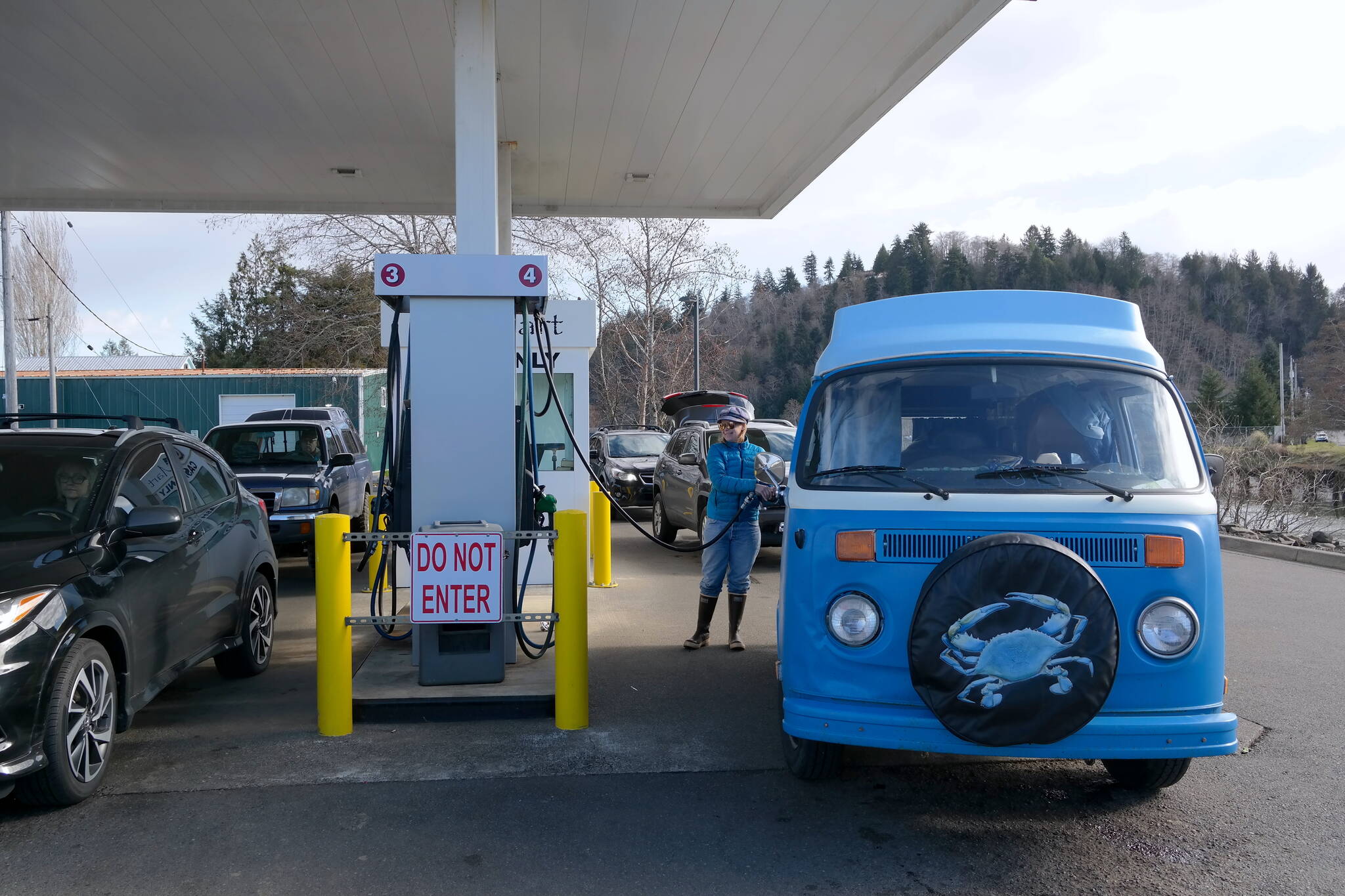Gas prices began soaring nationally this week, and Grays Harbor County has been no exception.
As of Wednesday, March 9, gas prices had reached their highest recorded average price for Washington state at $4.631 per gallon, according to AAA. The national average per gallon for gasoline exceeded $4 for the first time since July 2008 on Sunday, March 5, and the rising prices show no sign of stopping.
Washington first reached its highest recorded average price for regular unleaded gasoline ever on Monday, March 7, at $4.449 per gallon, a record that was broken Tuesday, March 8, at $4.546 per gallon and again on Wednesday. Gas prices in Washington continue to be about 40 cents per gallon above the national average.
Locals and tourists alike are feeling the sticker shock at the pump, and it has the potential to alter their plans.
“It definitely makes me think about what I’m doing, and it will probably affect what I decide to do going forward,” said Central Park resident Willow Jorgenson.
Jorgenson drives a large retro van that she uses for surfing, but after deciding against hitting the waves on Wednesday, she regretted not swapping out the van in favor of her Prius.
“I was planning on going to Neah Bay this summer. They just reopened so I was really excited to head up there, but I planned it out and it’s going to cost like $80 in gas to go there and back,” she said.
Jorgenson isn’t the only one eager to get back out as pandemic restrictions are lifted. Jake Francis, who owns a business in Wisconsin and is on the road with his fiancée — a traveling nurse — is feeling caught between a desire to explore again and concern about the strain it places on his wallet.
“We’re young, and we’re trying to have fun,” he said. “I’m pretty nervous about gas prices exploding to be quite honest.”
Francis and his fiancée have been staying in Ocean Shores and are on their way to visit a friend in Oregon before returning to Wisconsin in April. While they recently enjoyed a scenic drive along the California coast, the experience cost them more than they had expected.
“I’ve known inflation was going to bring prices up for a while, so it wasn’t much of a surprise,” he said. “This has definitely caused a lot of savings to go away faster. It just costs a lot more.”
While inflation is a factor in the recent rise of gas prices, the unprecedented rise in the last week is largely due to the Russia-Ukraine conflict. Sanctions imposed on Russia for its invasion of Ukraine have hindered Russia’s ability to sell crude oil, which is a major determinant for gas prices. On Tuesday, President Joe Biden announced a formal ban on the U.S. import of all Russian energy products, including crude oil. The policy will likely cause the cost of fuel to increase even further.
The United Kingdom government joined Biden and announced that it will phase out Russian oil imports by the end of this year, with natural gas imports to follow.
Russian crude imports comprise only a small fraction of U.S. energy imports, but oil is priced on global commodity markets, so the loss of Russian oil affects prices at American pumps, regardless of where it’s used. Should the European Union follow the U.S. and the U.K. in formally banning Russian oil imports, customers will feel the effect even more.
“I’ve never seen gas prices this high in the 40 years that I’ve been getting gas,” said a Q-Mart employee in Aberdeen, who chose not to be identified. “For the most part, people come in with their opinions, but I just shake my head.”
Last week, the International Energy Agency (IEA) announced that it will release 61.7 million barrels of crude oil from its strategic reserves to reassure markets agitated by the effects of Russia’s invasion of Ukraine. Half of the release is expected to come from the U.S., and it is the largest coordinated release since the IEA was founded in 1974.
Only a handful of states are experiencing higher gas prices than Washington, with California at the top of the list. This is due in part to a state gas tax of just over 49 cents per gallon, one of the highest in the country.
In January 2022, Washington state senators from the Republican party proposed Senate Bill 5897, which would replace the gas tax with $15 billion in state surplus funds. The bill never made it out of committee, and was rejected again on Tuesday when Senator Simon Sefzik (R-42) tried to get the bill up for a vote on the Senate floor.
“This is a way, we talk about all the time, to give those families the relief that they deserve, especially as gas prices are continuing to rise,” Sefzik said according to an article from King 5 News.
Gas prices will also be driven up by higher demand. Summer vacations and the easing of pandemic restrictions will encourage Americans to hit the road more in the coming months, even though domestic production of oil has failed to return to pre-pandemic levels. Regardless of international conflicts, normal gas prices are unlikely to return in the near future.


